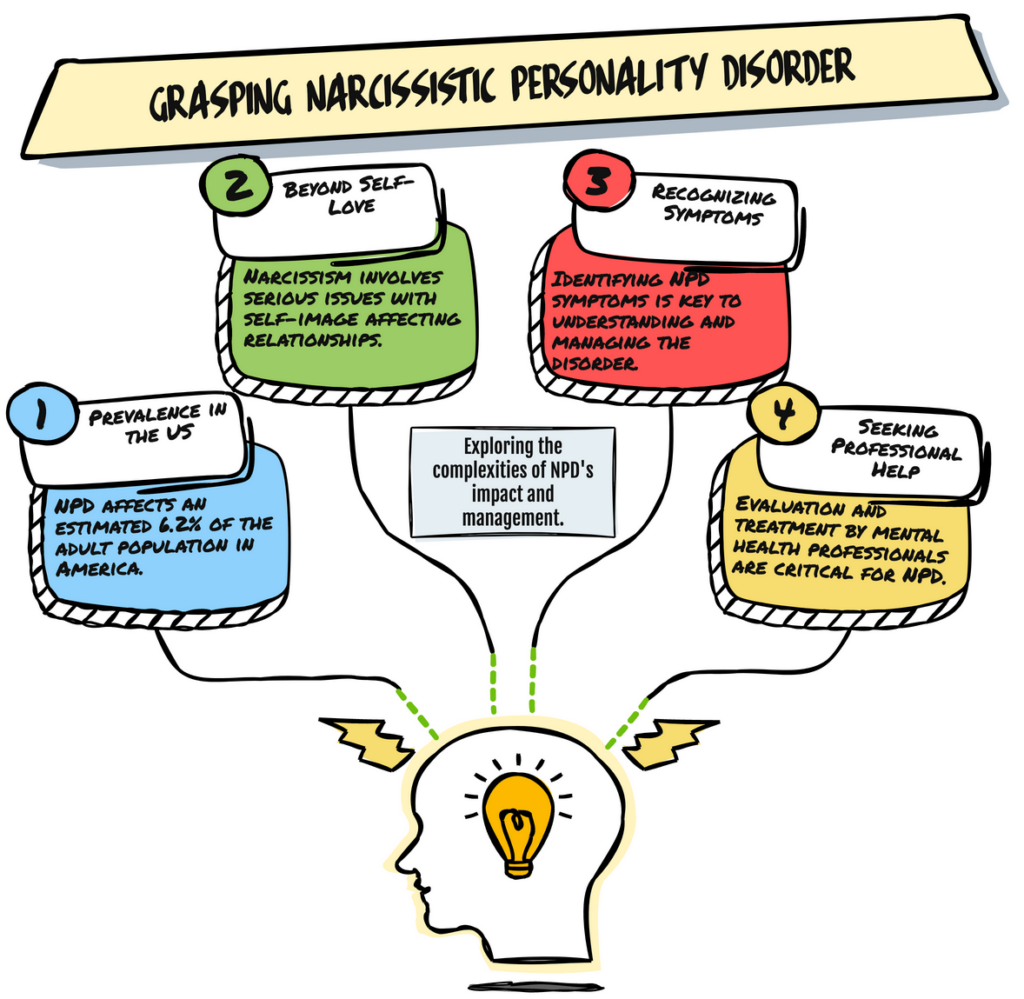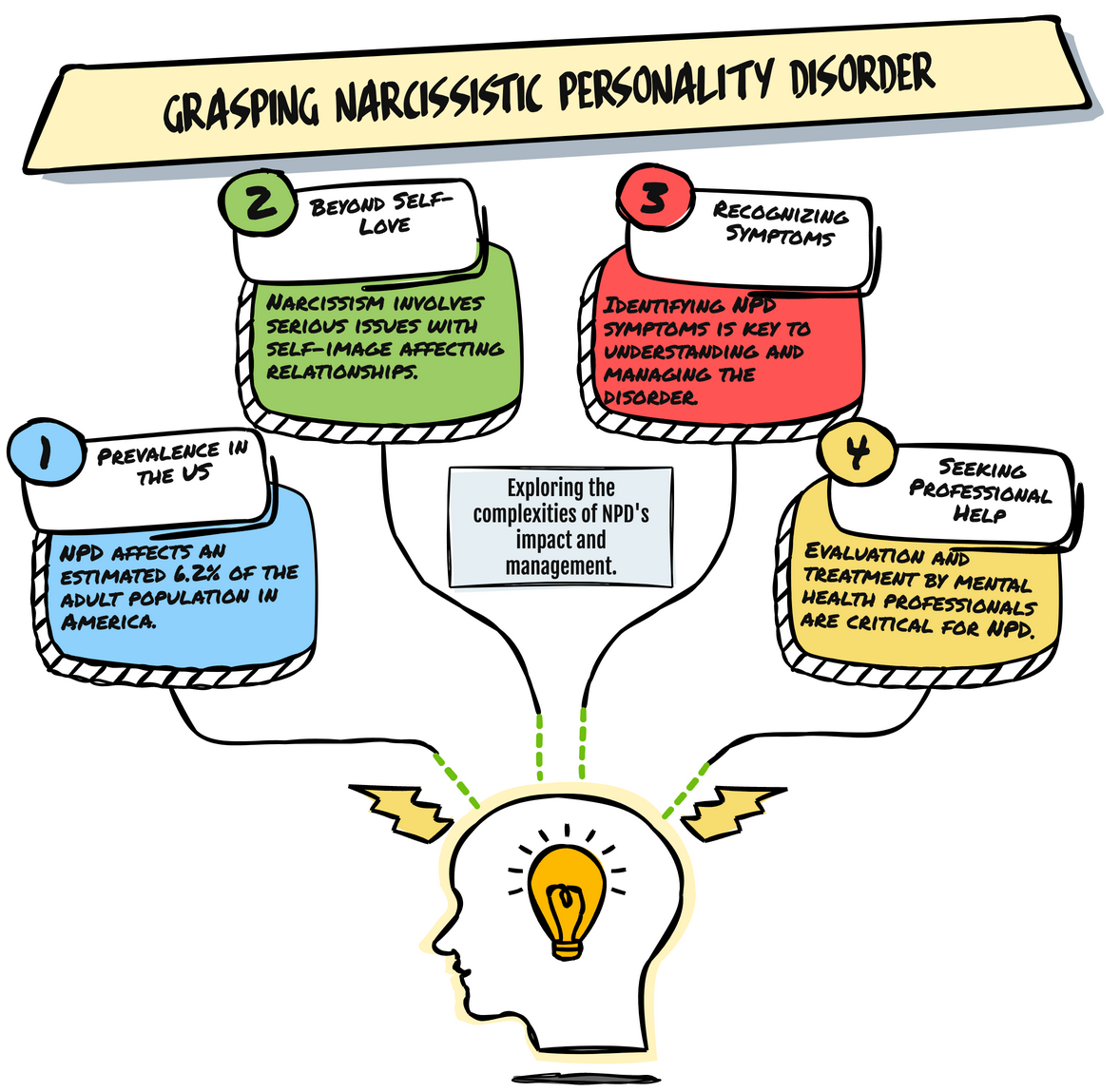Have you ever been in a relationship where it felt like every move you made was on shaky ground? Where your actions were constantly scrutinized and your thoughts and feelings were disregarded? I have experienced this firsthand, and I can confirm that it is incredibly damaging. It was only when I delved into the topic of narcissism that I realized the deeper issue at hand – Narcissistic Personality Disorder (NPD).
Narcissism is not just an inflated sense of self-importance; it is a complex psychological disorder that affects millions of individuals worldwide. Studies show that approximately 6.2% of adults in the United States have NPD, which means that you or someone you know may be impacted by this disorder without even realizing it.

In this article, we will explore the intricacies of narcissism and shed light on Narcissistic Personality Disorder. We will delve into the definition of NPD, the various symptoms and causes associated with it, and the different types of narcissistic behavior. By understanding the complexities of narcissism, we can gain insights into dealing with narcissistic individuals and seek appropriate support.
Key Takeaways:
- Narcissistic Personality Disorder (NPD) is a complex psychological disorder that affects approximately 6.2% of adults in the United States.
- Narcissism goes beyond an inflated sense of self-importance and can profoundly impact relationships and interpersonal dynamics.
- Understanding the symptoms, causes, and types of narcissistic behavior is crucial for recognizing and dealing with NPD.
- Seeking professional evaluation and accessing treatment options is essential for individuals with NPD.
- Support resources, such as support groups and hotlines, can provide guidance and assistance for individuals and their loved ones affected by NPD.
What is Narcissistic Personality Disorder?
Narcissistic Personality Disorder (NPD) is a complex and often misunderstood condition that falls under the category of personality disorders. It affects a significant number of people, impacting their thoughts, emotions, and behaviors, as well as their relationships with others. Understanding the symptoms, causes, and types of narcissistic behavior is crucial for identifying and recognizing individuals with NPD.

Defining Narcissistic Personality Disorder
Narcissistic Personality Disorder is characterized by a pervasive pattern of grandiosity, a constant need for admiration, and a lack of empathy towards others. Individuals with NPD often have an exaggerated sense of self-importance and a preoccupation with fantasies of unlimited success, power, brilliance, beauty, or ideal love. They may exploit others for personal gain and believe they are superior to those around them.
Understanding the Symptoms and Causes of NPD
The symptoms of Narcissistic Personality Disorder may include:
- Having an excessive sense of self-importance
- Believing they are special and unique
- Requiring constant admiration and attention
- Having a sense of entitlement
- Lacking empathy for others
- Exploiting others for personal gain
- Being envious of others or believing others are envious of them
- Displaying arrogant or haughty behaviors
The causes of NPD are multifactorial, involving a combination of genetic, environmental, and psychological factors. Some researchers suggest that childhood experiences, such as excessive praise or criticism, neglect, or abuse, may contribute to the development of NPD.

Types of Narcissistic Behavior
There are various types of narcissistic behavior that individuals with NPD may exhibit. These can include:
- Overt Narcissism: Overt narcissists display their grandiosity and superiority openly, seeking constant admiration and attention.
- Covert Narcissism: Covert narcissists may appear more humble and shy but still maintain an underlying sense of entitlement and need for admiration.
- Malignant Narcissism: Malignant narcissists combine narcissistic traits with a tendency towards aggression, sadism, and a lack of empathy.
- Somatic Narcissism: Somatic narcissists focus on their physical appearance and may engage in excessive exercise or cosmetic procedures to maintain their perceived beauty or attractiveness.
- Cerebral Narcissism: Cerebral narcissists believe they are intellectually superior to others and may constantly seek validation and admiration for their intellectual prowess.

Identifying Signs of Narcissism
Identifying the signs of narcissism can help in recognizing individuals with NPD. Some common signs include:
- Excessive self-centeredness and self-absorption
- An insatiable need for attention and admiration
- A lack of empathy and disregard for others’ feelings
- Exploitative behavior towards others
- Difficulty handling criticism or feedback
- A sense of entitlement and belief in their superiority
Recognizing Someone with NPD
Recognizing someone with Narcissistic Personality Disorder can be challenging, as individuals with NPD may mask their behavior in certain situations or manipulate others to maintain their grandiose self-image. However, some common signs that may indicate NPD include:
- A pattern of self-centeredness and an inability to consider others’ needs or perspectives
- A tendency to exploit or manipulate others for personal gain
- An exaggerated sense of superiority and entitlement
- A lack of empathy and a lack of remorse for their actions
- A constant need for admiration and validation from others
| Type of Narcissistic Behavior | Description |
|---|---|
| Overt Narcissism | Display of grandiosity and superiority, seeking constant admiration and attention. |
| Covert Narcissism | More humble and shy, but still maintaining an underlying sense of entitlement and need for admiration. |
| Malignant Narcissism | Combination of narcissistic traits with a tendency towards aggression, sadism, and a lack of empathy. |
| Somatic Narcissism | Focusing on physical appearance and engaging in excessive exercise or cosmetic procedures. |
| Cerebral Narcissism | Believing in intellectual superiority and seeking validation and admiration for their intellectual prowess. |
Dealing with Narcissists: Symptoms and Support
In relationships, navigating the complex dynamics of narcissistic behavior can be challenging. It’s important to recognize the signs and symptoms of narcissism to understand and address the impact it may have on self-esteem and admiration. In this section, we will explore how to recognize narcissistic behavior in relationships, the importance of seeking treatment for Narcissistic Personality Disorder (NPD), and the challenges involved in dealing with a narcissist. Additionally, we will discuss the signs and symptoms of NPD in a social context.

Recognizing Narcissistic Behavior in Relationships
Recognizing narcissistic behavior is crucial for maintaining one’s well-being in relationships. Some common signs of narcissistic behavior include an excessive need for admiration, a sense of entitlement, a lack of empathy, and a tendency to exploit others. It’s important to be aware of these red flags and trust your instincts when dealing with individuals who display these behaviors.
Seeking Treatment for Narcissistic Personality Disorder
When dealing with a narcissist, it’s essential to understand that seeking treatment for Narcissistic Personality Disorder can be a crucial step towards fostering healthier relationships. Individuals with NPD may benefit from psychotherapy, such as cognitive-behavioral therapy or psychodynamic therapy, to address the underlying causes of their narcissistic behavior and develop more adaptive coping strategies.

Understanding the Impact on Self-Esteem and Admiration
Being in a relationship with a narcissist can have a significant impact on one’s self-esteem and admiration. Their constant need for validation and dominance can lead to feelings of worthlessness and diminished self-confidence. It is important to recognize and address the detrimental effects that narcissistic behavior can have on one’s sense of self-worth and seek support to rebuild and strengthen self-esteem.

Challenges in Dealing with a Narcissist
Dealing with a narcissist poses unique challenges due to their manipulative and self-centered nature. Establishing boundaries, practicing self-care, and seeking support from friends, family, or therapists are vital in managing these challenges. It is important to prioritize one’s well-being and seek guidance on effective strategies for dealing with a narcissist.
Signs and Symptoms of NPD in a Social Context
The signs and symptoms of Narcissistic Personality Disorder may be evident in various social contexts. Some common indications of NPD in these settings include a persistent need for admiration, grandiose thoughts or fantasies, a sense of entitlement, and a lack of empathy towards others. Recognizing these signs can help assess the presence of NPD and inform appropriate action.

Narcissism and Mental Health: Diagnosis and Treatment
In this section, we will delve into the diagnosis and treatment of Narcissistic Personality Disorder (NPD). Understanding the psychological elements of narcissism is crucial in identifying and addressing this complex disorder. We will provide an overview of NPD symptoms and explore how narcissistic traits are analyzed for an accurate diagnosis.
Psychotherapy plays a significant role in the treatment of NPD. We will provide an overview of various psychotherapeutic approaches that have shown effectiveness in addressing the underlying issues associated with narcissism.
Furthermore, we will delve into different treatment approaches for Narcissistic Personality Disorder, including cognitive-behavioral therapy, psychodynamic therapy, and other modalities. These comprehensive treatment approaches aim to help individuals with NPD develop healthier thinking patterns and relating to others.
One of the critical aspects of NPD is the lack of empathy often observed in narcissists. We will explore the role of empathy and the lack thereof in individuals with NPD, shedding light on this characteristic that contributes to the challenges in their relationships and interactions with others.

Etiology and Risk Factors
In understanding Narcissistic Personality Disorder (NPD), it is crucial to explore the etiology and risk factors associated with this complex condition. By examining the genetic predisposition, developmental experiences and childhood trauma, and sociocultural influences, we can gain insights into the origins and contributing factors of NPD.
Genetic Predisposition
Research suggests that genetics may play a role in the development of NPD. Studies have found that individuals with a family history of NPD are more likely to exhibit narcissistic traits and behaviors. These findings suggest a potential genetic predisposition that contributes to the manifestation of NPD.

Developmental Experiences and Childhood Trauma
The experiences and traumas endured during childhood can significantly impact the development of NPD. Adverse childhood experiences, such as neglect, emotional abuse, or inconsistent parenting, may contribute to the formation of narcissistic traits as a coping mechanism. These experiences can influence self-esteem, identity formation, and interpersonal relationships, ultimately shaping the development of NPD.
Sociocultural Influences
Sociocultural factors also contribute to the development of NPD. Societies that prioritize individualism, competition, and material success may foster a breeding ground for narcissistic traits and behaviors. Media influence, societal norms, and cultural expectations all play a role in shaping the attitudes and behaviors associated with NPD.
| Etiology and Risk Factors of NPD | Genetic Predisposition | Developmental Experiences and Childhood Trauma | Sociocultural Influences |
|---|---|---|---|
| Role of genetics in the development of NPD | Individuals with a family history of NPD are more likely to exhibit narcissistic traits | Adverse childhood experiences contribute to the formation of narcissistic traits | Media, societal norms, and cultural expectations shape attitudes towards NPD. |
| NPD may have a genetic predisposition | Societal emphasis on individualism and material success can foster narcissistic behaviors. | Individuals with a family history of NPD are more likely to exhibit narcissistic traits. |
The table above summarizes the etiology and risk factors associated with NPD, providing a visual representation of the interplay between genetic predisposition, developmental experiences, and sociocultural influences in the development of this personality disorder.
Psychological Mechanisms
In Narcissistic Personality Disorder (NPD), various psychological mechanisms contribute to the development and maintenance of the disorder. Understanding these mechanisms is crucial in comprehending the complexities of NPD and its impact on individuals.
Self-esteem regulation and self-enhancement
One of the core psychological mechanisms of NPD is an intense need for self-esteem regulation and self-enhancement. Individuals with NPD often have fragile self-esteem and rely on external validation to maintain their sense of self-worth. They seek admiration, praise, and validation from others to bolster their self-esteem, often resorting to grandiose fantasies and self-aggrandizement.
This mechanism acts as a defense mechanism to protect against underlying feelings of inadequacy and vulnerability. By constantly seeking validation, individuals with NPD strive to maintain a positive self-image and shield themselves from feelings of worthlessness.

Impaired empathy and interpersonal difficulties
Another significant psychological mechanism in NPD is impaired empathy and interpersonal difficulties. People with NPD often struggle with empathizing with others, and their ability to understand and connect with the emotions and experiences of others is greatly compromised.
This impaired empathy can manifest in various ways, such as a lack of genuine concern for others, a tendency to exploit others for personal gain, and an inability to form deep and meaningful relationships. These interpersonal difficulties can result in strained relationships, conflicts, and a general inability to maintain healthy and fulfilling connections with others.
Cognitive and emotional aspects of NPD
The cognitive and emotional aspects of NPD also play a significant role in the disorder. Individuals with NPD often exhibit cognitive biases that contribute to their self-enhancement and grandiose self-perception. They may have an inflated sense of their own abilities, achievements, and importance while simultaneously disregarding or devaluing the abilities and achievements of others.
Emotionally, individuals with NPD can be susceptible to criticism or perceived threats to their self-esteem. They may respond with anger, defensiveness, or even aggression when their inflated self-image is challenged. These emotional reactions serve to protect their fragile self-esteem and maintain their sense of superiority.
Overall, understanding the psychological mechanisms at play in NPD is vital in identifying the underlying dynamics and challenges faced by individuals with this disorder. By gaining insights into these mechanisms, professionals and individuals can develop targeted therapeutic interventions and support strategies to address the complexities of NPD effectively.

Treatment and Management
In order to effectively address Narcissistic Personality Disorder (NPD), a comprehensive approach to treatment and management is necessary. This section will explore the various psychotherapeutic approaches and pharmacological interventions used in the treatment of NPD, as well as the prognosis and challenges faced in managing this complex disorder.
Psychotherapeutic Approaches
Psychotherapy plays a key role in the treatment of NPD, offering individuals a safe space to explore their emotions, thoughts, and behaviors. Two commonly used psychotherapeutic approaches for NPD include:
- Cognitive-Behavioral Therapy (CBT): This approach focuses on identifying and challenging distorted thoughts and beliefs, helping individuals develop healthier thinking and behavior patterns.
- Psychodynamic Therapy: This approach delves into the unconscious processes and underlying issues that contribute to NPD, facilitating insight and transformation.
Pharmacological Interventions
While there are no medications specifically approved for the treatment of NPD, certain medications may be prescribed to address co-occurring symptoms or conditions. For example, antidepressants or anti-anxiety medications may be utilized to manage comorbid depression or anxiety.
Prognosis and Challenges in Treatment
The prognosis for NPD varies depending on numerous factors, including the individual’s willingness to engage in treatment and their commitment to personal growth. It is important to note that treatment for NPD can be challenging due to a number of factors:
- The inherent complexity and deep-seated nature of narcissistic traits and behaviors.
- The resistance to change often exhibited by individuals with NPD.
- The difficulties in establishing a therapeutic alliance and developing empathy in therapy.
Despite these challenges, with appropriate and consistent treatment, individuals with NPD can make significant progress in managing their symptoms and improving their overall well-being.
Impact on Relationships and Society
In this section, we will explore the impact of Narcissistic Personality Disorder (NPD) on relationships and society as a whole. NPD can have significant consequences for interpersonal dynamics and relationship patterns, affecting not only the individuals directly involved but also those in their broader social circles. It is important to understand these implications in order to navigate the challenges posed by NPD effectively.

Interpersonal Dynamics and Relationship Patterns
NPD can have a profound impact on interpersonal dynamics and relationship patterns. Those with NPD often exhibit grandiosity, a need for admiration, and a lack of empathy. This can lead to a power imbalance, manipulation, emotional abuse, and an overall toxic dynamic in personal relationships. Partners of individuals with NPD may experience a range of negative emotions, such as confusion, isolation, and low self-esteem.
In some cases, individuals with NPD may repeatedly engage in patterns of idealization and devaluation, causing instability and confusion in their relationships. They may alternate between showering their partners with affection and praise, and then suddenly devaluing and criticizing them. These dynamics can undermine trust and create a cycle of emotional turmoil for the individuals involved.
NPD can also impact family relationships, including parent-child dynamics. A narcissistic parent may prioritize their own needs and desires over those of their children, leading to neglect or emotional abuse. This can have long-lasting effects on the self-esteem and emotional well-being of the children involved.

Societal Implications and Public Awareness
The impact of NPD extends beyond individual relationships, affecting society on a broader scale. Narcissistic individuals may seek positions of power and influence, driven by their need for admiration and a sense of superiority. This can have implications for societal structures, as narcissistic leaders may prioritize their own interests over the well-being of the larger community.
Furthermore, there is a growing need for public awareness and education surrounding NPD. Many individuals may be unaware of the signs and symptoms of NPD, leading to difficulties in recognizing and addressing the disorder. Increased awareness can help individuals and communities better understand the dynamics of NPD, promote empathy, and encourage early intervention and support.
Addressing NPD in Various Settings
Addressing NPD requires a multi-faceted approach that encompasses various settings, such as the workplace and family. In the workplace, it is crucial to create environments that foster healthy communication, empathy, and accountability. Implementing policies and procedures that promote fairness and equal opportunities can help minimize the negative impact of NPD on productivity and employee well-being.
Within the family, addressing NPD may involve seeking professional help and therapy to understand and manage the impact of the disorder on family dynamics. Developing strategies for setting boundaries, fostering open communication, and promoting emotional well-being can be beneficial for both the individuals with NPD and their loved ones.
Table:
| Category | Impact |
|---|---|
| Interpersonal Dynamics | Power imbalances, manipulation, emotional abuse |
| Relationship Patterns | Idealization and devaluation cycles, instability |
| Societal Implications | Narcissistic leaders, prioritizing self-interests |
| Public Awareness | Recognizing signs and symptoms, promoting empathy |
| Addressing NPD | Creating healthy work environments, seeking professional help in families |
By addressing NPD in various settings, we can work towards minimizing its negative impact on relationships and society as a whole. It is crucial to promote awareness, empathy, and provide support for both individuals with NPD and those affected by their behaviors.
Get Help
Seeking professional evaluation and accessing appropriate treatment options are crucial for individuals dealing with Narcissistic Personality Disorder (NPD). If you or someone you know is struggling with NPD, reaching out for help is the first step towards healing and recovery.
Seeking Professional Evaluation
It is important to consult a qualified mental health professional who specializes in NPD for an accurate diagnosis. They will conduct a comprehensive assessment and evaluate the symptoms and behavior patterns to determine if NPD is present. Seeking professional evaluation is essential for developing an effective treatment plan tailored to the specific needs of the individual.
Treatment Options
Once diagnosed with NPD, various treatment options are available to help manage and address the associated challenges. Psychotherapy, such as cognitive-behavioral therapy (CBT) or psychodynamic therapy, is often used to target the underlying causes of NPD and develop healthier coping mechanisms. Additionally, group therapy or support groups can provide a supportive environment for individuals to share experiences and learn from others facing similar struggles.
Support Resources
Support resources play a significant role in the recovery process for individuals with NPD. Support groups, both in-person and online, offer a safe space for individuals to connect and share their stories. Mental health hotlines are available around the clock to provide immediate support and guidance. Online communities and forums also offer a platform for individuals to seek advice, share resources, and connect with others who understand their challenges.
Here are some organizations and resources that can provide support for NPD:
| Organization/Resource | Contact Details |
|---|---|
| Narcissistic Abuse Recovery Program | Website: www.narprogram.com Phone: 1-800-XXX-XXXX Email: info@narprogram.com |
| Narcissistic Personality Disorder Support Community | Website: www.npd-support.com Email: support@npd-support.com |
| National Alliance on Mental Illness (NAMI) | Website: www.nami.org Helpline: 1-800-950-NAMI (6264) |
Addressing Other Concerns
Aside from seeking professional evaluation and accessing treatment options, it is important to address various other concerns related to NPD. This may include managing co-occurring mental health conditions, improving interpersonal relationships, and developing healthy coping strategies. By addressing these concerns holistically, individuals can work towards personal growth and overall well-being.
Conclusion
In conclusion, understanding narcissism and its impact on individuals and relationships is crucial in fostering a supportive environment for those with Narcissistic Personality Disorder (NPD). Throughout this article, we have explored the complexities of NPD, its symptoms, causes, and various types of narcissistic behavior.
By recognizing the signs of NPD in others, we can navigate relationships with a greater understanding and empathy. Seeking professional evaluation and engaging in psychotherapeutic approaches, such as cognitive-behavioral therapy and psychodynamic therapy, can significantly contribute to the management and treatment of NPD.
It is essential to remember that individuals with NPD may struggle with impaired empathy and interpersonal difficulties. Addressing these challenges within relationships and society is critical for long-term growth and healing. By providing support resources such as support groups, hotlines, and online communities, we can create safe spaces for individuals with NPD to connect and seek guidance.
In summary, understanding narcissism helps us cultivate empathy and compassion while navigating relationships with individuals who have NPD. By promoting awareness and providing support, we can contribute to a more inclusive and understanding society for those affected by Narcissistic Personality Disorder.
FAQ
What is Narcissistic Personality Disorder?
Narcissistic Personality Disorder (NPD) is a mental health condition characterized by a pattern of self-obsession, grandiosity, and lack of empathy. Individuals with NPD have an inflated sense of self-importance and a constant need for admiration from others.
What are the symptoms and causes of NPD?
The symptoms of NPD may include a sense of superiority, a sense of entitlement, a lack of empathy, a need for excessive admiration, and a tendency to exploit and manipulate others for personal gain. The causes of NPD are complex and may involve a combination of genetic, environmental, and sociocultural factors.
How can I identify signs of narcissism in others?
Signs of narcissism may include an exaggerated sense of self-importance, a constant need for attention and validation, a lack of empathy towards others, and a tendency to exploit and manipulate relationships for personal gain. It is important to remember that only a qualified mental health professional can diagnose someone with NPD.
How can I deal with a narcissist in a relationship?
Dealing with a narcissist in a relationship can be challenging. It is important to set healthy boundaries, practice self-care, and seek support from a therapist or support group. It may also be helpful to seek couples therapy or family therapy to address relationship dynamics and improve communication.
What are the treatment options for Narcissistic Personality Disorder?
Treatment for Narcissistic Personality Disorder typically involves psychotherapy, such as cognitive-behavioral therapy or psychodynamic therapy. The goal of therapy is to help individuals with NPD develop healthier coping mechanisms, improve self-esteem, and learn to relate to others in a more empathetic manner.
How does Narcissistic Personality Disorder impact relationships and society?
Narcissistic Personality Disorder can have a significant impact on relationships, leading to difficulties in communication, power struggles, and emotional abuse. In society, the influence of narcissistic leaders and the prevalence of narcissistic behavior can contribute to a culture of self-centeredness and a lack of empathy.
Where can I seek help for Narcissistic Personality Disorder?
If you suspect that you or someone you know may have Narcissistic Personality Disorder, it is important to seek professional evaluation from a mental health provider. They can provide a proper diagnosis and recommend appropriate treatment options. Additionally, support resources such as support groups, hotlines, and online communities can offer guidance and understanding.
What is the significance of understanding narcissism?
Understanding narcissism is crucial in recognizing and addressing the challenges associated with Narcissistic Personality Disorder. It promotes empathy and helps individuals build healthier relationships. Increased awareness of narcissistic behavior can also contribute to creating a more compassionate and supportive society.










